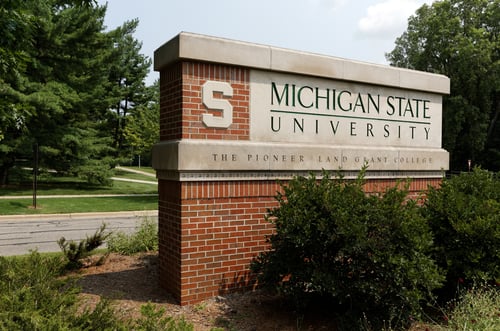Boards of trustees approve Michigan State University College of Law merging with MSU

An entrance to Michigan State University in East Lansing, Michigan/Katherine Welles (Shutterstock.com).
Despite its name, Michigan State University College of Law is a separate entity from Michigan State University. But that may change soon.
Boards of trustees at both MSU and the law school—a private institution once known as Detroit College of Law, and affiliated with MSU in 1995—have voted in favor of a merger, the Lansing State Journal reported. Lawrence Ponoroff, dean of the law school, told the ABA Journal that in addition to accrediting authority approvals, the agreement likely will need approval by the Michigan attorney general’s office. He does not think the merger will be complete before 2020.
The law school is a “separate legal entity” from MSU, Ponoroff wrote in an email, but they are “completely integrated academically and have been for some time.” The law school has the same promotion and tenure process as the university, and the MSU president and provost also serve in those positions for the law school.
“In short, the consistent trend over the last 20-plus years has been to more tightly integrate the law college into the university. This is simply the next, albeit final, step in that process,” Ponoroff wrote.
Between 2013 and 2016, the law school’s total enrollment dropped from 907 to 760, according to the school’s 509 Standard Information Reports. And there were 784 students in 2017. The Lansing State Journal reported that the law school’s revenue was in the black for 2014 and 2015 tax years, but in 2016 expenses outpaced revenue to the tune of $1.74 million.
“This action will stabilize us,” Ponoroff said at a law school board of trustee’s meeting, according to the article. “But it’s not a panacea, and we will still all need to continue to work very hard to bring the law school to the next plateau.”
Annual tuition at the law school is $44,200, according to the school’s website. Ponoroff wrote that a significant percentage of the student body receives scholarships, and he does not anticipate a tuition reduction if the agreement with MSU is finalized.
The law school’s first-time bar passage rate for 2017 was 81.37 percent, and its ultimate bar passage rate for 2015 was 88.85 percent, according to ABA bar passage data. Out of 231 graduates in 2017, 137 had full-time, long-term jobs that require bar passage, and 40 had full-time, long-term, JD-advantage positions.



